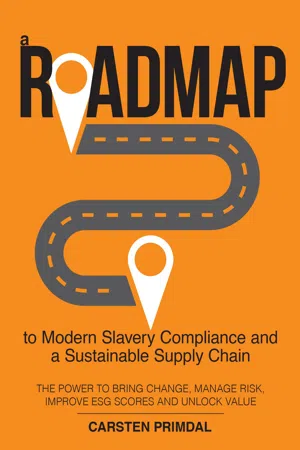
A Roadmap to Modern Slavery Compliance and a Sustainable Supply Chain
The power to bring change, manage risk, improve ESG scores and unlock value.
- English
- ePUB (mobile friendly)
- Available on iOS & Android
A Roadmap to Modern Slavery Compliance and a Sustainable Supply Chain
The power to bring change, manage risk, improve ESG scores and unlock value.
About this book
Have you heard about Modern Slavery Acts and wondered where to start to become compliant? Do you have a gut feeling that you know next to nothing about your supply chain, other than the name of the factory and perhaps the defect rates on the product you receive? Are you worried that there may be some unsavoury practices hidden away somewhere in your supply chain?
If you answered yes to the above questions, this book is for you.
Carsten Primdal shares his knowledge on how to implement measures allowing you to gain important insights from your supply chain. These insights improve transparency, allow you to unlock value, empower partners to trust you, and increase customer and investor confi dence.
The methods, tools and structure in this book have already helped many global businesses, and now they can benefit you too.
Frequently asked questions
- Essential is ideal for learners and professionals who enjoy exploring a wide range of subjects. Access the Essential Library with 800,000+ trusted titles and best-sellers across business, personal growth, and the humanities. Includes unlimited reading time and Standard Read Aloud voice.
- Complete: Perfect for advanced learners and researchers needing full, unrestricted access. Unlock 1.4M+ books across hundreds of subjects, including academic and specialized titles. The Complete Plan also includes advanced features like Premium Read Aloud and Research Assistant.
Please note we cannot support devices running on iOS 13 and Android 7 or earlier. Learn more about using the app.
Information
- ‘social’ refers to labour conditions, such as slavery or child labour
- ‘environmental’ refers to resource usage and pollution
- ‘ethical’ refers to bribery, corruption and fraud.

- Repelling customers: Such practices are often criminal, and overexploit both human and natural resources. Engaging in criminal conduct can result in criminal charges being laid and the business must apply resources defending itself. In the process, consumers can lose trust and walk away. If such practices become public knowledge, customers may be repelled from buying.
- Attracting customers: Consumers are becoming more conscious of their personal impact on the world and want to minimise this by purchasing from likeminded companies. This presents an opportunity for businesses ready to act and who walk the talk. This is an opportunity to attract and retain customers.
- 40% of consumers are interested in ethically or sustainably sourced products
- 32% of consumers check product labels for claims about sustainability
- 25% of consumers actively look for product origins when making a purchase decision.
- 52% would pay more for food and beverage products if they are ethically sourced
- 45% would pay more for clothing and footwear
- 44% would pay more for pharmaceuticals.
- 30% of US consumers would pay 5% more for a product that is ethically sourced
- 28% would pay up to 20% more.
- social exploitation
- resource exploitation
- ethical misconduct.

Table of contents
- Cover
- Title
- Testimonials
- With gratitude
- Copyright
- Contents
- Recommended reading
- Foreword
- Introduction: discovering what’s really going on
- 1. What is an ethical supply chain?
- 2. Unethical activities within supply chains
- 3. Domestic and international responses to sustainable supply chain issues
- 4. Preparing
- 5. Defining
- 6. Implementing
- 7. Monitoring and evaluating
- 8. The modern slavery acts
- Checklists, templates and policies
- Conclusion
- About the author
- Also by carsten primdal
- Bibliography